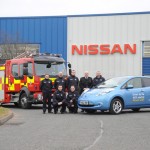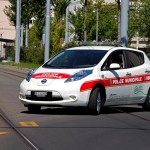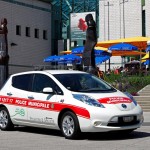Law enforcement teams, firefighters and medics across Europe are adopting Nissan LEAF – the world’s most popular electric vehicle – as a key frontline emergency support vehicle.
Emergency services in Portugal, France, UK and Switzerland have deployed LEAFs as community support vehicles, with a number of other countries considering making the switch to battery power in 2013.
Jean-Pierre Diernaz, Director of Electric Vehicles, Europe said,
“Emergency first responders and law enforcement communities rely heavily on their vehicles. The fact that so many forces across Europe are choosing Nissan LEAF for urban-based community support roles shows how significant zero emissions and low running costs – fuel and maintenance – have become. As well as helping to save the environment, vastly reduced fuel bills mean a fleet of Nissan LEAFs can make a serious contribution to a bottom line, making budget savings that can be reinvested in supporting the communities in which they serve.”
Fittingly, French community nurse Sylvie Lailler in June purchased the milestone 10,000th Nissan LEAF to arrive in Europe since sales began in March 2011. She uses her LEAF to make daily house visits to elderly patients near the north west of Paris.
The multi-award winning LEAF has been chosen by the various first responders for differing reasons but all cite the car’s zero emissions credentials as the most important motivation for the switch from conventional petrol and diesel cars.
The first force in the world to go electric was Portugal’s PSP (Polícia de Segurança Pública), which has been running eight Nissan LEAFs as part of its Safe School Program for the last year. Fitted with blue flashing lights, sirens and clear ‘Polícia’ markings they can also perform other police duties at any time.
Superintendent Paul Gomes Valente, National Director of PSP, said: “We pride ourselves in being the first police force in the world to incorporate cars with zero-emission technology as part of our 5,000 vehicle fleet. We want to continue contributing to the reduction in pollution in large urban centres and the introduction of the 100 per cent electric Nissan LEAF sets a new benchmark for our fleet.”
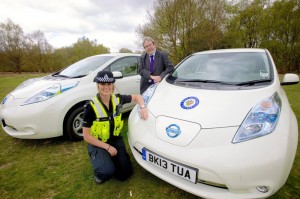
In the UK, West Midlands Police have placed an order for 30 Nissan LEAFs for use by its officers to visit victims of crime and attend other pre-arranged meetings as ‘diary cars.’ Averaging around 70 kms a day – well within a full charge range – these LEAFs allow the force to free-up its vehicle fleet for other vital crime-fighting duties.
Bob Jones, Police and Crime Commissioner for the West Midlands Police said,
“The LEAFs fit in perfectly with our operational requirements and will significantly cut our fuel costs while also reducing our carbon footprint.”
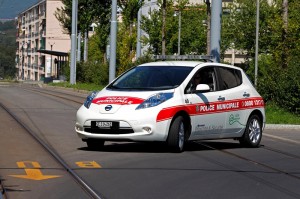
The Police Municipal in the Swiss town of Meyrin, 10km north of Geneva, has also adopted the zero emissions car, which forms part of force’s daily patrol fleet in the local community. The LEAF was purchased from the local Nissan dealer, which continues to support the police force by providing full access to their charging facilities.Maire, Monsieur Pierre-Alain Tschudi, explains, “The commune of Meyrin recently set a goal, as part of its political agenda, to reduce its carbon footprint. In support of this initiative we decided to incorporate electric vehicles into our patrol fleet, thus not only reducing our CO2 emissions, but equally our noise pollution. Their presence has created a discussion point in and around the community, raising awareness of the importance of zero emissions.”
In Scotland, the Scottish Police Services Authority (SPSA) has taken delivery of two Nissan LEAFs for community work. As well as environmental gains, the force is keen to save money. The move not only saves SPSA money but also supports ambitious plans set out by the Scottish Government to become carbon neutral by 2050.
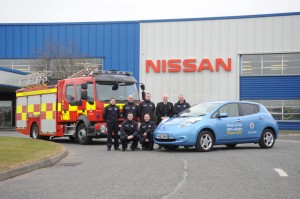
Meanwhile, to accommodate its new fleet of Nissan LEAFs, the UK’s County Durham Fire and Rescue Service has ensured its new headquarters currently under construction at Belmont, Country Durham, is EV friendly. Three charging points are planned as the service looks to further expand its environmental commitment by adding more electric vehicles to its fleet.
Source; Nissan

